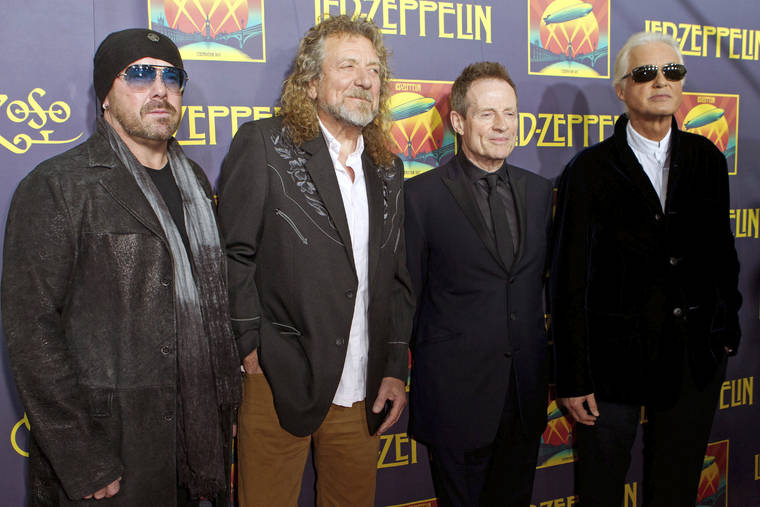A group of federal judges aren’t sure all that glitters is gold, and they don’t seem to be buying that a new trial is necessary in the copyright fight over the Led Zeppelin song, “Stairway to Heaven.”
Members of an 11-judge panel at a Monday hearing before the 9th U.S. Circuit Court of Appeals in San Francisco harshly and consistently challenged a plaintiffs’ attorney who argued that a new trial is justified and that jurors should be allowed to hear the recorded versions of the songs in the lawsuit that alleged 1971’s megahit “Stairway” was stolen from 1968’s “Taurus,” by Spirit.
The estate of the late Randy Wolfe of Spirit sued and lost at a 2016 trial that included testimony from Led Zeppelin guitarist Jimmy Page and singer Robert Plant, but a three-judge 9th Circuit panel earlier this year ordered a new trial and Led Zeppelin appealed to the larger group of judges.
The case was thrown out over what that the three judges unanimously said were poor instructions that should have allowed jurors to consider that combinations of simple elements in “Taurus” could be considered original and protected.
But most of Monday’s hearing was spent on plaintiffs’ attorney Francis Malofiy’s argument that the copyrighted composition of “Taurus” should include the song as performed, not merely as written on paper.
Several judges were skeptical.
“You’ve got to get your sound recording in to win, don’t you?” Judge Andrew D. Hurwitz said. “You lose the case unless you do. A hundred times out of a hundred.”
The album version of “Taurus” is far more similar to “Stairway to Heaven” than the sheet music, which Malofiy said was a poor transcription.
While the 1909 copyright law that covers “Taurus” protects the sheet music as deposited with the U.S. Copyright Office, Malofiy said legal precedent allows a “look to other evidence, the best evidence, better evidence,” and that a song’s recorded version can be considered.
Some judges felt that he was trying to use a backdoor to get the recording to be considered part of the copyright and played at trial.
“I’m asking you a question: ‘What work in your view is entitled to copyright protection?’ It should be simple,” said Hurwitz, who often hounded Malofiy during the hearing and demanded yes-or-no answers when he thought the lawyer was being evasive.
“I don’t think it’s the sound recording that’s copyrighted, I think it’s the composition embodied in the sound recording,” Malofiy said.
That prompted Judge M. Margaret McKeown to ask, “You want to take the sound recording and essentially reverse engineer what would be the sheet music for the sound recording?”
Malofiy answered, “I think you could look at it that way, yes.”
At issue is the classic introductory riff to “Stairway to Heaven,” constantly played by amateurs in guitar shops for nearly 50 years, which leads into the opening lyrics, “There’s a lady who’s sure, all that glitters is gold, and she’s buying a stairway to heaven.”
Malofiy told the court that Page, who wrote the riff, said he does not even read music, so it’s ridiculous to merely consider the paper version of “Taurus.”
“Why are we looking at this artificial analysis that never happened in the real world?” the lawyer said. “It’s wrong, it’s artificial, it’s imaginary. What we do know, and what we proved at trial, is that Jimmy Page has five of Spirit’s albums in his record collection.”
Led Zeppelin attorney Peter Anderson argued that Malofiy was trying to bring up an entirely new and irrelevant issue with talk of the sheet music and recording.
“At no point in this case,” Anderson said, “did the plaintiff ever take the position that the deposit copy was in error.”
The U.S. government also weighed in on the case, and sided with Led Zeppelin.
Government attorney Daniel Tenny said at Monday’s hearing that the “Taurus” recording could be considered under more recent copyright law, but under the 1909 law that applies, only the sheet music matters.
“It’s clear that copyright owners were told … that all you’re getting protection for is what you deposited with us,” Tenny said.
Led Zeppelin’s trial win stood in contrast to other recent high-profile cases. Jurors decided in a 2015 trial that Robin Thicke’s “Blurred Lines” copied Marvin Gaye’s “Got to Give It Up,” and a jury earlier this year found that Katy Perry’s hit “Dark Horse” copied from a Christian rap song.
———
This story has been corrected to show that it was the three-judge 9th Circuit panel that ordered a new trial.
———
Follow AP Entertainment Reporter Andrew Dalton on Twitter at https://twitter.com/andyjamesdalton .


